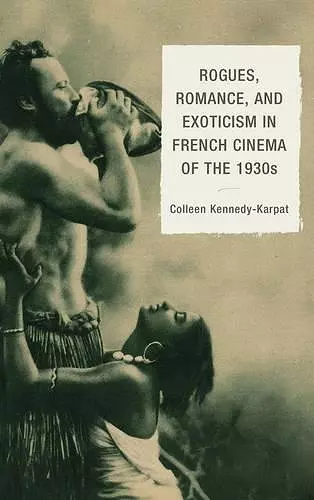Rogues, Romance, and Exoticism in French Cinema of the 1930s
Format:Paperback
Publisher:Fairleigh Dickinson University Press
Published:24th Feb '15
Currently unavailable, and unfortunately no date known when it will be back
This paperback is available in another edition too:
- Hardback£81.00(9781611476132)

Many popular French films of the 1930s captured the world and brought it into neighborhood cinemas for filmgoers who craved adventure. These films often served as visual postcards from the French empire, which enjoyed an unprecedented visibility in domestic popular culture between the world wars. But the public appetite for the exotic also transcended imperial borders. Exoticist films displayed landscapes and different that lay beyond the metropole, many of which were not subject to European rule. This broad conception of the exotic meant that French narrative cinema represented both colonial and non-colonial settings and populations, developing a coherent set of tropes that were shaped, yet not entirely defined, by the politics of imperial rule. Empire alone cannot address the full range of the French exoticist imaginary that was projected onto movie screens in the 30s. Only by venturing beyond imperial boundaries can we fully understand how the French saw non-Westerners and, by extension, how they saw themselves during this tumultuous decade. Rogues, Romance, and Exoticism in French Cinema of the 1930s proposes a critical framework for exoticist cinema that includes and exceeds the limits of empire. From rogue colons to the métisse in love, from the deserts of North Africa to the streets of Shanghai, this book identifies and analyzes recurring figures, common settings, major stars, plot devices, and narrative outcomes that dominated exoticist cinema at its popular peak.
Scholars of classical French cinema will know that a great deal has been written about ‘colonial’ cinema, with attention often returning to a relatively few well-known films, typically set in North Africa, that come to stand in for the broader corpus. At the same time, it is often assumed that the same cinema is a prolongation of the broader colonial project and somehow delivers (or betrays) a propagandist message. Yet popular cinema is a more complex object than this, and ‘colonial’ film is a research object with an illusory coherence. Seeking to develop a more adequate approach, Colleen Kennedy-Karpat broadens the object of study to include exoticism more generally and moves well outside the familiar corpus of films to discuss neglected works and less studied performers. She convincingly demonstrates that, while a colonial setting may indeed place limits on what a film can say or show, ‘colonial’ cinema also shares features with the exotic and, to that extent, needs studying in terms of the pleasures it offers rather than its uneven propaganda value. . . .[T]he book is welcome for its willingness to open up new ground and challenge dubious critical orthodoxies. * French Studies *
... original, beautifully written, and ground-breaking in its designation of an entirely new field of study... [this book] will become a standard against which future work in this field will be measured. ... -- Sandy Flitterman-Lewis, Rutgers University, Organizer of the conference, Hidden Voices: Childhood, the Family, and Anti-Semitism in Occupation France
ISBN: 9781611478099
Dimensions: 229mm x 153mm x 17mm
Weight: 336g
230 pages